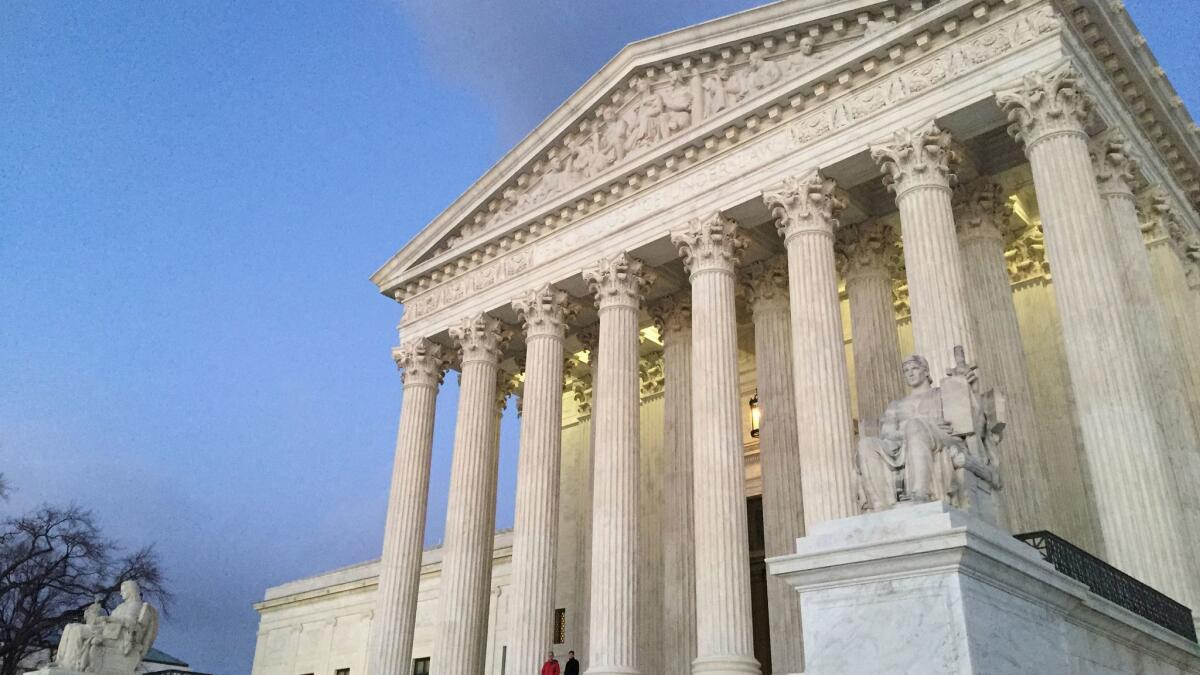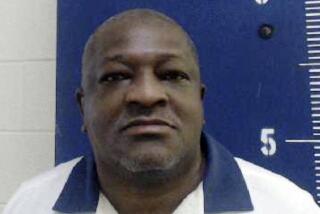Supreme Court orders review of the role race played in case of black man on Georgia’s death row

The Supreme Court voted Monday to give a black inmate convicted of murder in Georgia a chance to overturn his 27-year-old death sentence because of racist comments made by a white juror years later.
The unsigned opinion prompted a dissent from Justice Clarence Thomas and two other justices, who derided their colleagues for “ceremonial handwringing” that “callously delays justice” for the black woman who was the murder victim.
For the record:
7:20 p.m. Jan. 8, 2018An earlier version of this report referred to Pena-Rodriguez vs. Colorado as Pena-Rodriquez vs. Colorado.
In 1990, Keith Tharpe ambushed and assaulted his ex-wife and shot and killed her sister, Jacquelin Freeman. A few months later, a jury convicted him of those crimes and unanimously voted in favor of a death sentence.
He was set to be executed on Sept. 26 when his lawyers presented to the Supreme Court a statement from Barney Gattie, one of the jurors in Tharpe’s case.
Gattie had spoken to defense lawyers in 1998 and said he saw “two types of black people,” some of whom were “nice black folks” like Freeman and her family. He used the n-word to characterize the others.
“I felt Tharpe, who wasn’t in the ‘good’ black folks category in my book, should get the electric chair for what he did… After studying the Bible, I have wondered if black people even have souls,” according to Gattie’s statement.
The Supreme Court issued a late-night order to stop Tharpe’s execution. And Monday, the justices issued a three-page ruling that told the 11th Circuit Court in Atlanta to reconsider Tharpe’s plea for a new sentencing hearing.
The appeals court had previously rejected Tharpe’s request, noting that state judges reviewed what Gattie had said and found no evidence Tharpe had been a victim of a racial bias in the jury room.
“Our review of the record compels a different conclusion,” the justices said in Tharpe vs. Sellers. They said Gattie’s affidavit “presents a strong factual basis for the argument that Tharpe’s race affected Gattie’s vote for a death verdict.”
The opinion stops well short of reversing Tharpe’s death sentence, however. He still “faces a high bar” in overturning a state judge’s ruling that Gattie’s racist views did not play a role in the jury’s deliberations, the court wrote.
The high court has long struggled with the question of whether and when federal judges should intervene to reopen old death penalty cases that were resolved in state courts.
Since the 1990s, both the Supreme Court and Congress have said federal judges should generally defer to the factual rulings of state courts and reverse them only for extraordinary reasons.
But last year, the high court changed course somewhat in two decisions involving race. It reopened the case of a black death row inmate in Texas whose sentencing hearing included testimony from a crime expert who said blacks are more likely than whites to commit future crimes.
“Some toxins can be deadly in small doses,” said Chief Justice John G. Roberts Jr. in Buck vs. Davis, explaining why that testimony called for a new sentencing hearing.
And in the case of a Mexican American convicted of a sexual assault, the court in Pena-Rodriguez vs. Colorado said trial judges should reconsider a jury’s verdict if they learn that a juror made racist comments during the deliberations.
Lawyers for Tharpe cited both decisions in the emergency appeal that spared their client’s life.
“We are thankful that the U.S. Supreme Court recognized the serious implications for fundamental fairness of the clear evidence of racial animus on the part of one of the jurors who sentenced Mr. Tharpe to death,” Brian Kammer, a lawyer for Tharpe, said Monday. “We look forward to pressing Mr. Tharpe’s case in the 11th Circuit.”
Lawyers for Georgia had told the court that Gattie, who is deceased, had disavowed his initial statement to the defense lawyers and said he had been drinking heavily. He later testified before a judge and said his views on race did not affect his decision as a juror. The judge also heard from the other jurors, two of whom were black, and they insisted race played no role in their deliberations.
In a 13-page dissent, Thomas, a Georgia native and the court’s only African American, said Gattie’s views “are certainly odious. But their odiousness does not excuse us from doing our jobs correctly.”
“The court must be disturbed by the racist rhetoric in that [first] affidavit and must want to do something about it. But the court’s decision is no profile in courage,” he said. Justices Samuel A. Alito Jr. and Neil M. Gorsuch joined his dissent.
Major questions before the Supreme Court this year »
On Twitter: DavidGSavage
More to Read
Get the L.A. Times Politics newsletter
Deeply reported insights into legislation, politics and policy from Sacramento, Washington and beyond. In your inbox three times per week.
You may occasionally receive promotional content from the Los Angeles Times.







